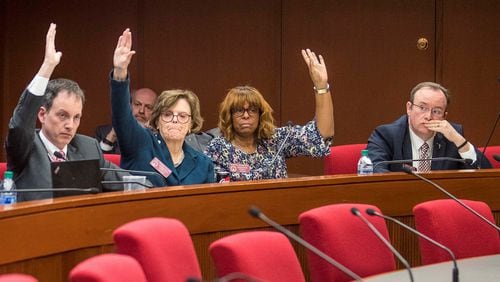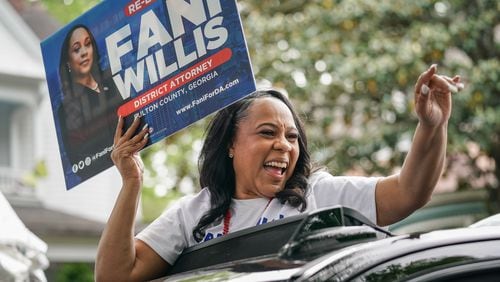A panel of Georgia representatives voted Monday in favor of creating a partisan primary in the state's upcoming U.S. Senate election, introducing a new challenge to Republican Sen. Kelly Loeffler's candidacy despite Gov. Brian Kemp's veto threat.
The coalition of Republicans and Democrats on an elections subcommittee voted 8-2 to approve the fast-moving legislation before this year’s elections. The bill could receive a committee vote Tuesday as it races toward the full House.
The measure would benefit U.S. Rep. Doug Collins, a Georgia Republican and leading defender of President Donald Trump during his impeachment. Collins is planning to run for Senate against Loeffler, whom Kemp appointed in December after U.S. Sen. Johnny Isakson resigned.
Under current Georgia law, both Republicans and Democrats would meet in a free-for-all election in November. The measure that advanced Monday, House Bill 757, would require a special primary May 19, the same date as regularly scheduled primary elections for offices besides the president. Georgia's presidential primary is March 24.
The vote is a sign of growing friction between some Republican lawmakers and Kemp during a legislative session dominated by debate over budget cuts.
State Rep. Scot Turner, who opposed the bill, said lawmakers are attempting to change election rules in the middle of a race. Turner accused House Speaker David Ralston of trying to bully lawmakers.
“Somebody doesn’t like what the governor has done with his appointment,” said Turner, a Republican from Holly Springs. “We have a situation where the speaker will criticize his own members of his own caucus for working with Democrats at certain times, and then we have a situation where he’s willing to work with Democrats in this case because he doesn’t like a decision that the governor made.”
Ralston, an ally of Collins’ when he was a member of the state House, said the bill provides “order and certainty” to voters.
“The underlying principle of this legislation is a fair, comparable playing field for all those seeking elected office. Surely that is something we can all agree on,” said Ralston, a Republican from Blue Ridge.
Supporters of the measure didn’t mention Loeffler or Collins by name, instead pitching the proposal as a way to set up a head-to-head contest between Republican and Democratic candidates in November.
"It boils down to whether you believe in the party process and whether you believe those voices should be heard," said House Governmental Affairs Chairman Shaw Blackmon, a Republican from Bonaire, speaking in support of the bill pending before his committee. "It benefits Georgians. It benefits the party process, which is an integral part of our elections process."
Kemp sent a message Sunday that the legislation for a special primary election is dead on arrival if it reaches his desk.
“You don’t change the rules at halftime to benefit one team over another,” said Candice Broce, Kemp’s spokeswoman. “People are sick and tired of it. The governor will veto any bill that attempts to undermine the rule of law for perceived political gain.”
House Minority Leader Bob Trammell said Democrats could benefit from a head-to-head contest in November instead of a multiperson special election.
“The democratic process is all about competition,” said Trammell, a Democrat from Luthersville. “Voters have yet to have a say with respect to the Senate seat. By having a primary followed by a general election, it gives voters the maximum chance to weigh in.”
The Democratic candidate lost the last time there was a special election for a seat in Congress. Democrat Jon Ossoff received the most votes in a 2017 special election but fell short of a majority. In a runoff, Republican Karen Handel defeated Ossoff.
In this year’s race for the U.S. Senate, Loeffler and Collins are the Republican candidates who intend to run.
Among Democrats, educator Matt Lieberman and former federal prosecutor Ed Tarver are seeking the Senate seat. The Rev. Raphael Warnock, the senior pastor of historic Ebenezer Baptist Church, is also considering running.
The proposal for a special primary was added to a bill that would allow Secretary of State Brad Raffensperger to set the candidate qualifying period for the Senate election. Raffensperger's spokesman has said he wants candidate qualifying during the first week in March, the same time that candidates in other races will file their intention to run.
All Democrats and most Republicans backed the legislation in Monday's subcommittee. The two votes against the measure came from Turner and state Rep. Barry Fleming, a Republican from Harlem, who objected to the proposal for a primary election being attached to a bill setting candidate qualifying dates.
LEGISLATIVE COVERAGE
The Atlanta Journal-Constitution has the largest team covering Georgia's Legislature and offers expertise on issues that matter to taxpayers. Get complete daily coverage during the legislative session at www.ajc.com/politics.
About the Author








